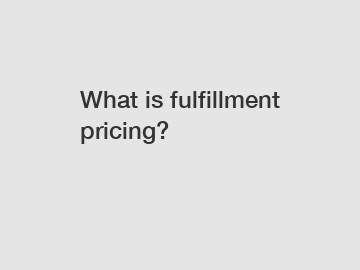What is fulfillment pricing?
Fulfillment pricing is a critical aspect of e-commerce businesses that involves the costs associated with warehousing, packaging, and shipping products to customers. Understanding fulfillment pricing is essential for businesses looking to optimize their operations and maximize profits. In this article, we will discuss what fulfillment pricing is and how it can impact your business.
### What is Fulfillment Pricing?
Fulfillment pricing refers to the costs associated with storing, packaging, and shipping products to customers. This includes expenses such as warehousing fees, packing materials, labor costs, and shipping fees. Fulfillment pricing can vary significantly depending on factors such as the size and weight of the products, the number of orders processed, the shipping destination, and the level of service required.

### Factors Affecting Fulfillment Pricing.
There are several factors that can impact fulfillment pricing for e-commerce businesses. Some of the key factors include:
Warehouse Location: The location of the warehouse where products are stored can have a significant impact on fulfillment pricing. Warehouses located in more expensive areas or regions with higher labor costs may result in higher fulfillment costs.
Product Size and Weight: Larger and heavier products typically require more storage space, packaging materials, and labor to process and ship. As a result, fulfillment pricing for these products is often higher compared to smaller and lighter items.
Order Volume: The number of orders processed by a business can also impact fulfillment pricing. Higher order volumes may result in lower costs per order due to economies of scale, while low order volumes may lead to higher costs.
Shipping Destination: The distance and shipping method used to deliver products to customers can affect fulfillment pricing. Shipping products internationally or using expedited shipping methods often results in higher shipping costs.
Level of Service: The level of service required, such as expedited shipping, gift wrapping, or special packaging, can also impact fulfillment pricing. Offering additional services to customers may increase fulfillment costs but can also enhance the customer experience.
### Importance of Optimizing Fulfillment Pricing.
Optimizing fulfillment pricing is crucial for e-commerce businesses to remain competitive and profitable. By understanding the factors that impact fulfillment costs and implementing strategies to minimize expenses, businesses can improve their bottom line and increase customer satisfaction. Some ways to optimize fulfillment pricing include:
Negotiating with Suppliers: Working closely with suppliers to negotiate pricing for packaging materials, shipping services, and warehousing can help businesses lower fulfillment costs.
Implementing Efficient Processes: Streamlining fulfillment processes, such as inventory management, order processing, and shipping, can help reduce labor costs and improve efficiency.
Utilizing Technology: Leveraging technology, such as automated order fulfillment systems and inventory management software, can help businesses save time and reduce errors in fulfillment processes.
Outsourcing Fulfillment: Outsourcing fulfillment to third-party logistics providers (3PLs) can help businesses reduce costs by leveraging the provider's expertise, resources, and infrastructure.
In conclusion, fulfillment pricing is a critical aspect of e-commerce businesses that can have a significant impact on their operations and profitability. By understanding the factors that influence fulfillment pricing and implementing strategies to optimize costs, businesses can improve their efficiency and effectiveness in fulfilling customer orders. Contact us to learn more about how we can help you optimize your fulfillment pricing and improve your e-commerce business.
For more information, please visit Postal parcel logistics software cost, Logistics management system, global parcel system team.

Comments